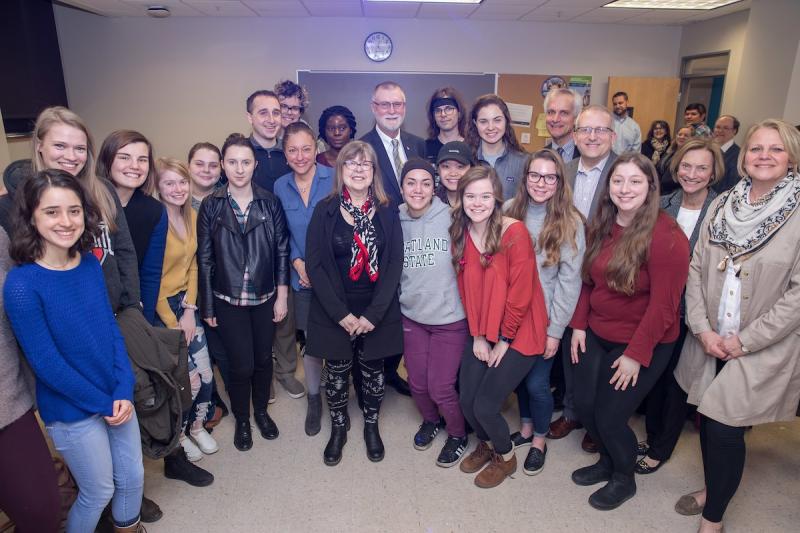Earlier this year, Professor of French Danielle Marx-Scouras received the Alumni Award for Distinguished Teaching. Faculty members are nominated for this award by present and former students and colleagues and selected by a committee of alumni, students, and faculty. Provost McPheron and Deans Peter Hahn and Janet Box-Steffensmeier as well as other colleagues and friends from FRIT surprised Marx-Scouras with the award while she was teaching class this February. In September, Marx-Scouras also had the chance to celebrate this achievement at the first football game of the season, where President Drake invited and congratulated her and other award receivers in the field of the Ohio Stadium.

Marx-Scouras was also awarded Ohio State’s Rodica C. Botoman Award for Distinguished Undergraduate Teaching and Mentoring in 2004, and the inaugural Ronald and Deborah Ratner Distinguished Teaching Award in 2014. For the latter, Marx-Scouras had to go through a rigorous application process that included a Teaching Philosophy statement, in which she was asked to create a concise summary of the questions and notions that she puts at the forefront of every course she teaches. In this statement, Marx-Scouras describes that she urges her students not to separate “French” and “Francophone” and to think about and challenge the notions of “Frenchness,” “foreignness,” and “identity.” She teaches students to understand a Francophone world that includes France, the marginal societies of France, Quebec, former colonized nations, and all those who have been influenced by these cultures. Marx-Scouras shared thoughts on these topics in a recent Voices of Excellence podcast, which can be found here.
As a child, Marx-Scouras grew up speaking both French and English, and spending time between Belgium and the U.S. In primary school, she experienced both positive and negative aspects of being bilingual and not having a single identity. As a scholar and teacher, she has continued to study these issues throughout her career. She uses her own experiences to urge her students to understand the modern world, find their own voice in it, and be “at the forefront of their respective fields tomorrow.”

Marx-Scouras teaches a variety of courses in FRIT on topics including contemporary French and Francophone (Maghreb, Quebec, ethnic minorities in France) literatures, theory, intellectual history, and popular music. She regularly teaches French 2101.01H – Honors Introduction to French and Francophone Studies, as well as French 3103 – French Conversation. She also teaches a number of upper level courses on topics such as “Texts and Contexts in North Africa,” “’Minor Art’ from Gainsbourg to Stromae: Popular Music as a Political Act,” and “Marseille, the City with a ‘bad rap’.”
In the past 20 years, Marx-Scouras has focused more on more on teaching popular French and Francophone music. She has taken advantage of technology grants to bring musicians to the classroom via videoconference concerts and thus allow students to experience an authentic immersive event without leaving an Ohio State classroom. She has organized four classroom video-concerts with the blues group Moussu T e lei Jovents from Marseille and Zebda from Toulouse. Just as she has been able to break the barrier between French and Francophone, with these concerts Marx-Scouras has broken the barrier between performers and audience, high and popular culture, teacher and student, and Ohio State and the Francophone world.
Marx-Scouras has also been a part of several study abroad programs. For 6 years she was the faculty lead on an intense summer French language program held at the Université Laval in Quebec. Not only does this program have a challenging curriculum, it also offers many cultural events, including a music festival that Marx-Scouras incorporated as part of the program. In 2012 she took a group of first year scholar students on an “Eccentric France” study abroad trip, as a result of which many students ended up on French national television, after running into the musical group Zebda while they happened to be interviewing. Thanks to the Ratner Award, Marx-Scouras was also able to organize the “France Beyond Borders” Program, where she shared with students many of the musicians, poets, and other local cultural figures, whom she had studied and met over the years. Students explored many parts and identities of France and Europe through this trip.

Marx-Scouras is the only scholar in the U.S. who has been able to bring so much of the Francophone musical and popular culture scene to American classrooms. Many of her students have expressed that the video concerts and other cultural exchange activities that they experienced in her classroom were the most inspiring part of their time in college. Many have also gone on to further explore topics introduced in her classroom via thesis projects or travel.
When asked about her favorite aspect of teaching, Marx-Scouras responds, “That’s easy – the students.” She explains that her teaching has always been student centered; they learn from her and she learns from them. “If you let them do their thing, they are amazing,” she says.
